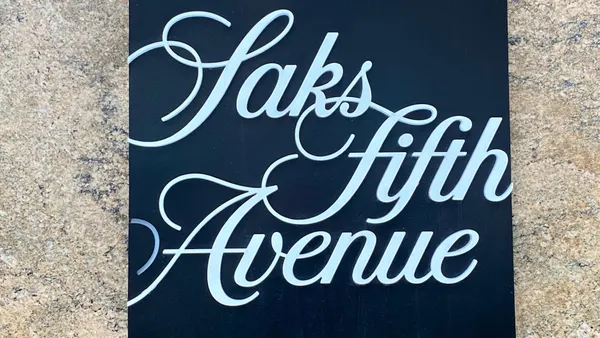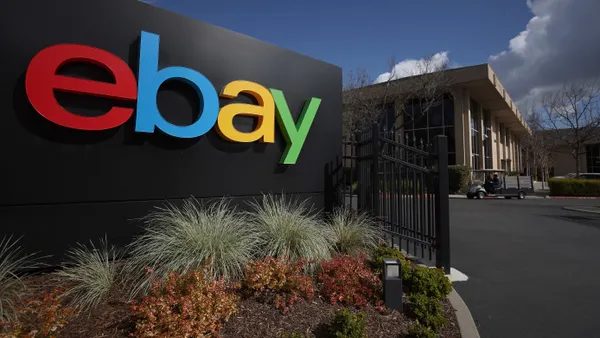Dive Brief:
- Online sales are growing faster than anticipated, reported FTI Consulting. This week, FTI forecasted that U.S. online retail sales will pass the $1 trillion mark in 2025, compared to 2027, which it predicted last year.
- FTI anticipates that U.S. e-commerce will be nearly $525 billion by the end of 2018, compared to $452 billion in 2017. Online sales are now 13.2% in the U.S., excluding automobiles and fuel, and if the grocery segment is left out, 15.7%. FTI also forecasts that the total share of U.S e-commerce will more than double by 2030, but then level out at around 25%.
- Amazon will continue to be a dominant, if not overwhelming, presence. Its share of online retail sales has rocketed from 23.1% in 2014 to 35.7% in 2017. In 2018, it is 39.7% of the market share and is expected to reach 50% by 2023, FTI said in its forecast report.
Dive Insight:
Online retail sales in the U.S. are growing so quickly FTI Consulting moved up its prediction of when they will reach $1 trillion by two years — to 2025. But Amazon will continue its all-consuming dominance of e-commerce, reaching a disproportionate 50% share by 2023. Amazon was responsible for about 30% of the growth in total U.S. retail sales in 2017 and two-thirds of the growth of online retail sales.
A recent report on global e-commerce trends from Coresight Research, incorporating data from Juniper Research, confirmed this strong growth. Revenues for global marketplace platforms are predicted to more than double from $18.7 billion in 2017 to $40.1 billion in 2022, driven by the sharing economy. The Americas will represent 57.2% of the 2022 total. A forecast by eMarketer is also roughly consistent with FTI's. Amazon will garner 49.1% of U.S. e-commerce this year, up from 43.5% last year. That translates to $258.2 billion in sales, up 29.2% over last year.
Third-party marketplace sales are a big part of Amazon's success and reflects an "if-you can't-beat-them, join-them" attitude among other retailers, FTI said. Large and small retailers are joining the Amazon ecosystem because that's where much of the consumer traffic is concentrated. FTI reported that while Amazon's first-party sales have been increasing at 20% per year, third-party sales have grown at almost 45% per year. This contrasts with the annual growth rate for total U.S. online sales of 14%-16%, meaning that the U.S. e-commerce growth without Amazon is in the high single digits. FTI estimated that almost 60% of Amazon's gross merchandise value came from third-party merchants in 2017, a big increase from 46% in 2014.
"We all recognize that Amazon is the preeminent online retailer, but what we've come to realize in the last couple of years is that Amazon's total retail reach, particularly its third-party sales, is considerably larger than previously thought," said Khaled Haram, senior managing director in the retail and consumer products practice at FTI Consulting in a press release. "The Amazon ecosystem is taking the vast majority of U.S. online retail sales growth. This is hampering efforts by large omnichannel retailers to retain or win market share without compromising margins and profitability."
U.S. e-commerce sales growth made up 46% of 2017's total retail sales growth, which was an increase of 15 percentage points since 2014, according to FTI. But an omnichannel strategy is working for many large retailers, regardless of their overall profitability. Macy's obtains 21% of its total sales from e-commerce, followed by J.C. Penney at 18%. More than one-third of Urban Outfitters' sales are from the online channel, with Abercrombie & Fitch at 28%. In the past three years, the market value of Pier 1 Imports has plummeted 80%, but it now gets one-quarter of its sales from e-commerce.
"Those retailers with a distinctive and cohesive omnichannel strategy combined with the ability to flawlessly execute on the operational dimensions will steal share, at an increasing rate, from those that can't," J.D. Wichser, leader of the retail and consumer products practice and a senior managing director at FTI Consulting said in the press release.











